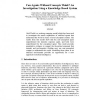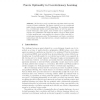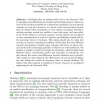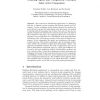53 search results - page 1 / 11 » Can Agents Without Concepts Think |
SGAI
2007
Springer
13 years 11 months ago
2007
Springer
Grid-World is a working computer model which has been used to investigate the search capabilities of artificial agents that understand the world in terms of non-conceptual content...
AAMAS
2004
Springer
13 years 4 months ago
2004
Springer
The development of the World Wide Web has changed the way we think about information. Information on the web is distributed, updates are made asynchronously and resources come onli...
ECAL
2001
Springer
13 years 9 months ago
2001
Springer
We develop a novel coevolutionary algorithm based upon the concept of Pareto optimality. The Pareto criterion is core to conventional multi-objective optimization (MOO) algorithms....
ER
2006
Springer
13 years 8 months ago
2006
Springer
Ontologies play an indispensable role in the Semantic Web by specifying the definitions of concepts and individual objects. However, most of the existing methods for constructing o...
MATES
2010
Springer
13 years 3 months ago
2010
Springer
The construction of distributed applications is a challenging task due to inherent system properties like message passing and concurrency. Current technology trends further increas...




